
20VC: Mailchimp's Ben Chestnut on The Biggest Leadership Lessons Scaling to a $12Bn Acquisition and $1BN+ ARR, The Secret to Happiness, Being a Great Husband and Father & Why 2021 was the Right Time To Sell to Intuit
Ben Chestnut is the Co-Founder of Mailchimp, the all-in-one marketing platform for small businesses. Last year, in Sept 2021 it was announced that Intuit would acquire Mailchimp for a reported $12BN. There are so many things to love about the Mailchimp journey to this point. First, Mailchimp was founded as the result of a side project of a design agency Ben and his co-founder, Dan, used to run. Second, Mailchimp is and has always been based in Atalanta, eschewing the notion you have to be in SF or NYC to build a massive business. Then third, they never raised venture funding for the business all the way until their $12BN acquisition. Ben led Mailchimp to over 1,200 employees and millions of global users. In Today's Episode with Ben Chestnut We Discuss: 1. From Mama's Kitchen to the Smell of Business and Founding Mailchimp: How did Ben turn a mediocre agency into the founding of Mailchimp? What was the a-ha moment? At what stage of the business did Ben quit the agency and go all in on Mailchimp? What sign did he need that Mailchimp had true product-market fit? When Ben's mother died, he bought every flower in the local town to commemorate her. How did Ben's mother impact the type of father and husband he is today? How did she impact the way that he led Mailchimp as CEO? Ben's fishing trips with his father played a big role in his early years, what were the single biggest lessons for Ben from his fishing trips with his father? 2. Ben Chestnut: The Leader: How does Ben define the term "high performance" in leadership? What does Ben mean when he says "the secret to happiness is to stay in your lane"? Why would Ben describe himself as the "leader of the misfits"? How did that early experience and labeling impact both the people he hired and the culture he created at Mailchimp? What does Ben mean when he says he used to have a "hands off, eyes off" leadership style? What have been the single biggest drivers in his development as a leader? 3. Ben Chestnut: The Person: Relationship to Money: How does Ben reflect on his relationship to money? How has it changed over time? Why does Ben still to this day buy lottery tickets with his wife? Conquering Fatherhood: What does being a great father to Ben mean? How does Ben attempt to instil the same work ethic and drive when his children are born into immense wealth? The secret to Marriage: What does Ben believe is the core to a successful and thriving marriage? How does Ben view his role in the marriage? How has it changed over time? Potential Lost Identity: A founder's identity is so closely tied to their company, how did Ben manage the challenge of selling his company but retaining his identity? What did Ben learn about himself through many different acquisition processes? 4. Mailchimp: The Business: Why did Ben never raise venture money in the 21 year journey of Mailchimp? Why did Ben never accept any of the acquisition offers that came before Intuit? How did Ben motivate his team after they knew each acquisition offer was being turned down? Why did Ben decide the acquisition by Intuit was the right decision for the company? How does Ben view his role in the company now and moving forward?
12 Dec 202250min
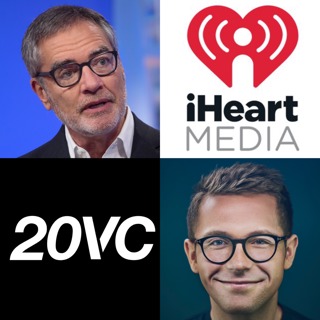
20VC: The Story of Turning Around MTV, AOL and Time Warner | How To Be Effective When Making Hard Decisions | Tactics vs Strategy and Why Plans Are BS with Bob Pittman, CEO @ iHeartMedia
Bob Pittman is Chairman and CEO of iHeartMedia, Inc., the number one audio company in America. Prior to iHeart, Bob has just had the most amazing career as a co-founder and programmer who led the team that created MTV. He has also led some of the most incredible turnarounds as CEO of MTV Networks, AOL Networks and Time Warner Enterprises and as COO of America Online, Inc. and later AOL Time Warner. In Today's Episode with Bob Pittman We Discuss: 1. From Flying Lessons to Radio: How Bob first made his way into radio at the age of 15? What does Bob know now that he wishes he had known when he started his career? What is the most painful lesson Bob has learned in his career that he is pleased to have learned? 2. Decision-Making in Leadership: How does Bob structure all decision-making as CEO today? Why does Bob ensure that all decisions are made within 24 hours? What are the pros and cons? How does Bob prevent consensus decision-making? How does Bob create dissent in a discussion? How do the best leaders know when to kill a project? What do most do instead? 3. Tactics vs Strategies: Why Plans Are BS! What is the difference between a tactic and a strategy? When is the right time to change your strategy and tactics? What have been Bob's biggest lessons on how to get teams on board with tactical changes? Why does Bob believe that plans are BS? When can they be useful? 4. The Secret to Messaging and Storytelling: What does Bob believe is the universal truth to successful consumer messaging? What has changed and what has not changed in the way companies tell stories to their customers? Is there a difference between a great product and a great company? What are examples? What excites Bob most about consumer habits today? 5. Bob Pittman: AMA: What does Bob believe is the success to successful parenting? How has it changed? How does Bob analyze his own relationship to money today? How has that changed? Why does Bob not believe in legacy? What do people get most wrong when it comes to ego?
9 Dec 202254min
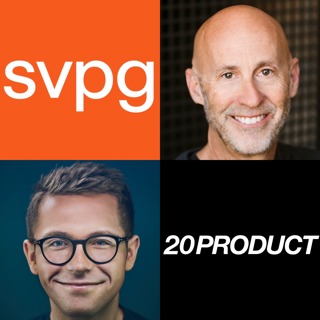
20 Product: Marty Cagan on The Four Questions of Great Product Management, Product Lessons from Marc Andreessen, Ben Horowitz and eBay's Pierre Omidyar & The Difference Between Truly Great Product Teams and the Rest
Marty Cagan is one of the OGs of Product and Product Management as the Founder of Silicon Valley Product Group. Before founding SVPG, Marty served as an executive responsible for defining and building products for some of the most successful companies in the world, including Hewlett-Packard, Netscape Communications, and eBay. He worked directly alongside Marc Andreesen and Ben Horowitz at Netscape and Pierre Omidyar at eBay. In Today's Episode with Marty Cagan We Discuss: 1. Entry into the World of Product From Engineering: How Marty first made his way into the world of product, having started life as an engineer? What does Marty know now that he wishes he had known when he started in product? What are Marty's biggest tips to anyone making the move from engineering to product? 2. Lessons from Marc and Ben at Netscape and Pierre @ eBay: What are the single biggest lessons Marty took from working side by side on product with Ben Horowitz and Marc Andreesen? What did Netscape do right? What did they do wrong? With hindsight, what would Marty have done differently? How did Marty break all of his rules by working with Pierre Omidyar? 3. Hiring a World Class Early Product Team: When is the right time to make your first product hire as a startup? What is the right profile for that first product hire? Senior or junior? If you go for the junior hire, how do you structure the rest of the team? If you go for the Senior hire, how do you structure the rest of the team? What are the single biggest mistakes startups make when hiring their first in product? Does Marty prefer someone with or without expertise in the domain you are in? 4. Mastering the Onboarding Process: What is the optimal onboarding process for all new product hires? How can leaders ensure that product hires see and understand all areas of the business? What can product leaders do to proactively impress in the first 30-60 days? What are clear red flags that a new product hire is not working out? How long do we give them?
7 Dec 202257min
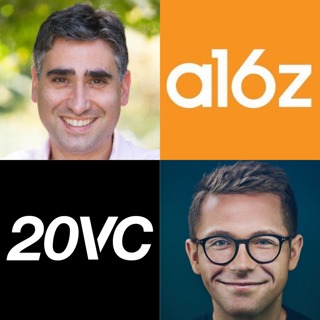
20VC: a16z's Martin Casado on How the Venture Model is Broken, Why VCs Should Be Running Wall St, Who Wins and Who Loses in the Next Generation of Venture & Investing Lessons from Marc Andreesen, Ben Horowitz and Chris Dixon
Martin Casado is a General Partner @ a16z where he focuses on enterprise investing. At a16z, Martin has led investments and serves on the board of dbt Labs, Fivetran, Material Security, Ambient AI and many more incredible companies. Before venture, Martin was previously the Co-Founder and CTO at Nicira, acquired by VMware for $1.26 billion in 2012. While at VMware, Martin served as Senior VP and General Manager of the Networking and Security Business Unit, which he scaled to a $600 million revenue run-rate business. In Today's Episode with Martin Casado We Discuss: 1. From $1.26BN Founder to Leading Enterprise Investing for a16z: How did Martin make his way into the world of VC and come to lead enterprise investing for a16z? What does Martin know now that he wishes he had known when he started investing? What have been some of his biggest investing lessons from Marc and Ben? 2. The VC Model is Broken and Why: Why does Martin believe that the current model for venture is broken? Why does Martin believe that VCs are not oracles and they were not gifted with picking ability? How will asset allocation more broadly fundamentally change over the next decade? Why will Silicon Valley take over and run Wall St? Why does Wall St not care about innovation and true technological development? Who will be the winners and who will be the losers in the next 10 years of venture? 3. Surviving a Crash - What Founders Need To Know: Layoffs: What is Martin's advice to founders on doing layoffs today? How much is the right amount to cut? Should it be done in one go? How should this be communicated to investors and the board? Scenario Planning: What three scenario plans should all founders be creating right now? How should they know which one is the right one to execute against? Comparisons: How should founders use and look to public company performance and market cap to determine which plan they should choose? Hiring Freeze: Why does Martin believe the biggest companies in the world make massive mistakes by freezing hiring? What should they do instead? 4. The Changing Guard at a16z: What have been the single best and worst changes a16z have made over the last 24 months? What are the first things to break when a firm scales as fast as a16z has done? Does Martin agree a16z returns will reduce with the scaling of their funds larger than ever? How does Martin look to train and educate his junior team? How does he advise them on surviving a downturn? What should they do? What should they not do? 5.) The Makings of a Great Board: What are the three types of board members? What is the best? What is the worst? What does Martin believe makes the truly great boards? What is the biggest advice Martin gives to young board members today? How has Martin changed as a board member over time? What does he need to improve? Items Mentioned in Today's Episode: Martin's Fave Book: The Weirdest People in the World: How the West Became Psychologically Peculiar and Particularly Prosperous
5 Dec 202251min

20VC: Plaid and Column Co-Founder, William Hockey on Why the Brands that Win in Fintech Will Not Be Financial Services Brands, What US Banking Can Learn from China & Why Companies Can Be Built Slower than People Think?
Will Hockey is the Co-Founder and Co-CEO @ Column, the only nationally chartered bank built to enable developers and builders to create new financial products. Before co-founding Column, Will was the Co-Founder, President, and CTO @ Plaid, a world-leading data network and payments platform. In 2020, Visa attempted to acquire Plaid for $5.3BN, however, this was blocked due to regulatory issues and the company went on to raise at a reported $13.4BN valuation just 9 months later. Additionally, Will is on the board of Scale.ai. In Today's Episode with Will Hockey We Discuss: 1.) The Founding of $13.4BN Plaid: How did Will make his way into the world of startups and come to found Plaid with Zach? If we are all a function of our histories, what is Will running from? What is he running toward? What does Will know now that he wishes he had known when he started Plaid? 2.) Will Hockey: The Makings of a Decacorn Founder: What does the term "high performance" mean to Will? How has this changed over time? Having had such a successful time building Plaid to $13.4BN, how does Will assess his own relationship to risk and his relationship to money? How does Will approach his own personal portfolio planning? Equity, debt, real-estate? How does Will optimize his own personal wealth? Column is his second time founding a company, what did Will decide to take from Plaid that worked well? What did he decide he would not do having seen it work badly at Plaid? 3.) The Building of Truly Great Teams: Why does Will believe that companies can be built so much slower than people think? How does Will determine the decisions that have to be made fast vs those with time? How does Will ensure the same size of urgency and speed within his team without this time or funding pressure? What have been Will's single biggest lessons when it comes to people acquisition and retention? 4.) Fintech: The Next 10 Years: How will the next 10 years look different from the last in fintech? What changes will be better? What will be worse? What is Will worried about? What is he excited about? What does Will mean when he says, "the US financial system can function like a protocol"? What does Will believe are some of the core myths of the US financial system? Why does Will believe the current financial system can and will fix a lot of what crypto is trying to solve? What barriers will prevent this from happening? Items Mentioned in Today's Episode: Will's Favourite Book: The World for Sale: Money, Power and the Traders Who Barter the Earth's Resources, Merchants of Grain: The Power and Profits of the Five Giant Companies at the Center of the World's Food Supply
2 Dec 202250min
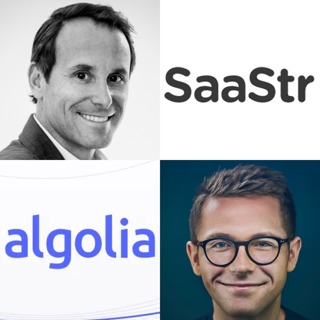
20VC: Jason Lemkin on Why Founders Do Not Care About Their VCs Anymore, Why Zoom Made Us All Worse Investors, Why 80-90% IRR Should Have Been Warning Signs and the Algolia Journey From Seed to $2.25BN Valuation
Jason Lemkin is one of the OGs of SaaS of the last decade. As the Founder of SaaStr, he has inspired more SaaS founders than one can imagine building "The World's Largest Community for Business Software." Jason also invests out of the $100M SaaStr Fund and in the past Jason has led rounds into TalkDesk, Pipedrive, Algolia, Gorgias, Salesloft, and many more incredible companies. Prior to founding SaaStr, Jason was the Co-Founder of Echosign, an early e-signature business, funded by Emergence Capital and that was acquired by Adobe for $100M. In Today's Episode with Jason Lemkin On Algolia We Discuss: 1.) Meeting the Unicorn: Algolia: How did Jason first come to meet Nicolas (Founder) and Algolia? What specific elements of cold emails make the best attract Jason's attention? What do they have in them? What are the most common mistakes people make with cold emails? What is the single biggest mistake Jason made when making the deal with Algolia? How did Jason lead their seed round when their round was "oversubscribed"? 2.) Competition and TAM: The Reasons To Say No: Competing with Free: How did Jason analyze the competitive landscape Algolia was facing? How did he gain comfort that they could compete and win against free and open-source? TAM Analysis: The TAM at the time for Algolia was $2M. How did Jason analyze the TAM at the time? How did he get comfortable with such a small TAM? What are the single biggest mistakes investors make when analyzing competition today? What are the biggest mistakes founders make when presenting the competitive landscape? What are the single biggest mistakes investors make when analyzing TAM today? What are the biggest mistakes founders make when presenting the TAM and how it breaks down? 3.) Investing Lessons Transition from CEO to VC: Jason has previously said one of his biggest lessons is "bet on what you know when you go from CEO to VC"? What did he mean by this? How can one keep this operator knowledge and mentality when one is a VC for a long time? What are the biggest pieces of advice that Jason would give to operators becoming investors? What are the biggest mistakes that Jason made in his first 3 investments as a VC? How did he change? 4.) Mastering the World of Venture Today: Why does Jason believe that he has become a worse investor with the rise of "remote investing"? Why does Jason believe he is a worse investor without having a partner in SaaStr Fund? Why does Jason believe that even the best founders do not want hard feedback anymore? Should we as VCs still give it to them? What has Jason learned here? Will we see great LP churn and many LPs leaving the asset class? What will happen to the existing incumbents with massive AUM and reduced performance?
30 Nov 202259min
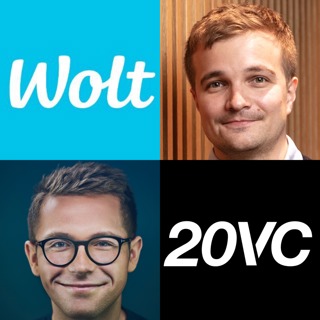
20VC: Wolt CEO, Miki Kuusi on Leadership Lessons Scaling to a Reported $8.1BN Exit to Doordash, Building Teams not Families, The Difference Between Trust and Safety Within Companies, How To Use Compensation to Create Culture & Why You Should Not Be Lookin
Miki Kuusi is the CEO of Wolt and Head of DoorDash International. In 2014 Miki founded Wolt with a mission to turn the smartphone into a remote controller for life, starting with delivering your favorite restaurant food, to you at home. Today Wolt operates in 23 countries, across several different categories, has over 4,000 employees, and last year, Doordash made the move to join forces with Wolt in a deal worth a reported $8.1BN. Previously, Miki was the CEO of Slush, one of the leading tech and investor events in the world attended by more than 25,000 people annually. In Today's Discussion with Miki Kuusi: 1.) Founding Slush and Wolt: An Entry into Startups: How did Miki come to found Wolt? What was that a-ha moment? Did Wolt have product-market-fit from Day 1? What was the turning point when they did? What does Miki know now that he wishes he had known when he started Wolt on Day 1? 2.) The Makings of a Truly Great Leader: How does Miki define "high performance" today in leadership? How does Miki think about what focus means in leadership? What is the hardest decision Miki has had to make when it comes to focusing the company? What did he learn from Ilkka @ Supercell? What does Miki believe is the KPI of success as the CEO? How does it change? What does Miki believe is the difference between good vs great leadership? What does Miki believe is the biggest sacrifice he has made as the CEO? 3.) Hiring a Team to Compete on a Global Stage: How does Miki use compensation to create a culture of ownership and accountability? Does Miki start from a position of trust and it is there to be lost or no trust and it is there to be gained? What is the difference between a team and a family in company building? What is the core difference between trust and safety in company building? Why does Miki always want to have trust but not want to have safety? What are the single biggest hiring mistakes that Miki has made? How has he learned from them? Why does Miki believe you do not want to hire people that have done it before but hire the people who have seen those people do it before? Why does Miki believe most companies are merely glorified recruiting operations? Does Miki believe that companies need to be as big as they have grown into, headcount-wise? 4.) Miki Kuusi: The Personal Journey What single day was the hardest day of the Wolt journey for Miki? How did it change him? Why does Miki believe that for their Series B, all-bar one VC turned them down? How does Miki assess his own relationship to risk and money today? Why is Miki an advocate for founders taking secondaries along the journey? What can Europe do to become a powerhouse in tech moving forward? Why did Miki decide to sell the company to Doordash? What is he most excited to learn from Tony Xu, Doordash Founder and CEO? Items Mentioned in Today's Episode: Miki's Favourite Book: The Hard Thing About Hard Things: Building a Business When There Are No Easy Answers
28 Nov 20221h 4min

20VC: When to Make Your First Growth Hire? Senior or Junior? How To Onboard Them? How To Monitor Their Progress? from Growth Leaders @ Facebook, Instagram, Lyft, Instacart, Miro and more
Casey Winters is the Chief Product Officer at Eventbrite. Prior to Eventbrite, Casey led the growth product team at Pinterest. Before Pinterest, Casey started the marketing team at Grubhub and scaled Grubhub's demand-side acquisition and retention strategies. Elena Verna is the Interim Head of Growth at Amplitude. Former exec @ Miro, Netlify, SurveyMonkey. Growth Advisor to companies including Krisp, MongoDB, Ledgy, Builder.io and SimilarWeb. Kieran Flanagan is SVP Marketing at HubSpot, where he has helped the business grow internationally, move to a product-led business, quadrupled its marketing demand, and built out its media team, including the acquisition of 'The Hustle.' Andy Johns career started in growth at Facebook when the company scaled from 100M-500M active users. Since he has worked in some of the leading growth orgs at companies like Twitter, Quora and more recently at Wealthfront as Head of Growth and President. Bangaly Kaba is the Director of Product Management @ Youtube. Prior to Youtube, Bangaly led the product growth and consumer product orgs at Instacart and before Instacart was Head of Growth @ Instagram, helping grow Instagram from 440M to > 1B monthly actives in 2.5yrs. Ed Baker is a growth advisor to various startups including Lime, Zwift, Whoop, Crimson Education, GoPeer, and Playbook. Ed was the VP of Product and Growth at Uber from 2013-2017. Prior to Uber, Ed was the Head of International Growth at Facebook. Adam Fishman was the Chief Product and Growth Offer @ Imperfect Foods. Before Imperfect, Adam was VP of Product and Growth @ Patreon, Before Patreon, Adam was the Head of Growth @ Lyft, Adam was the first growth and marketing employee hired and grew the team to 18 people. In Today's Discussion on When To Hire a Head of Growth: 1.) When is the right time to hear your first growth hire? 2.) Is this hire a senior growth leader or a more junior growth engineer? 3.) What can early-stage startups do to entice senior growth leaders to their early-stage company? 4.) What data infrastructure should be in place prior to hiring your first growth hire? 5.) What does the optimal onboarding process look like for all growth hires? 6.) What can founders and CEOs do to set their growth hires up for success?
25 Nov 202233min






















